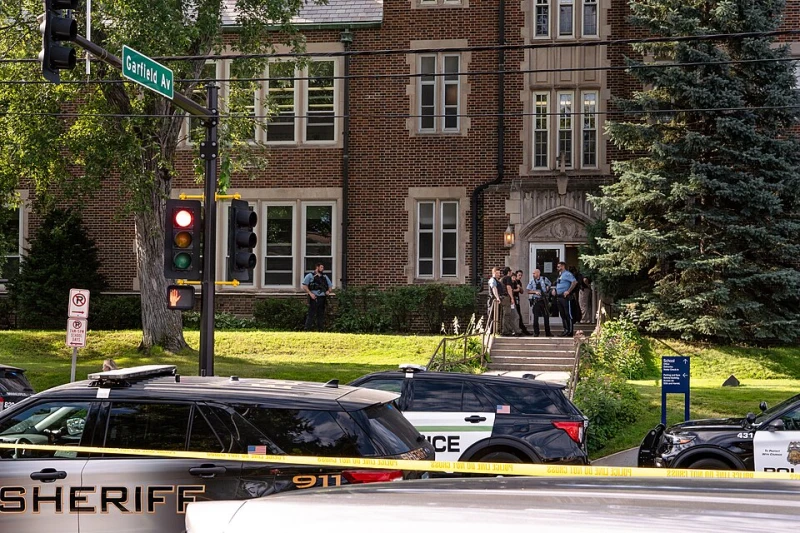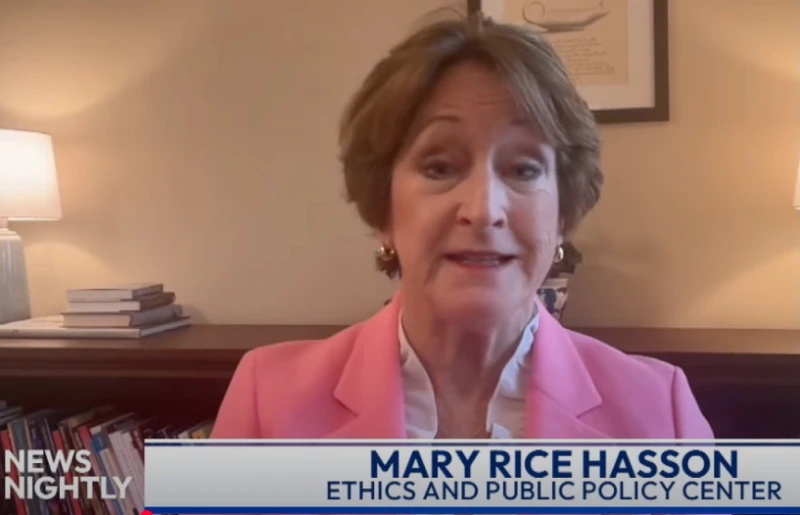

Police gather at Annunciation Catholic School in Minneapolis on Aug. 27, 2025, following a mass shooting that killed two children and injured 17 others, 14 of them children. / Credit: Chad Davis, CC BY 4.0, via Wikimedia Commons
CNA Staff, Sep 22, 2025 / 17:17 pm (CNA).
At a town hall meeting in Plymouth, Minnesota, over the weekend, three mothers whose children survived the school shooting at Annunciation Catholic Church in August advocated for stricter gun laws.
Two children were killed and 21 people were injured after Robin Westman, 23, a man who identified as a woman, shot through the stained-glass windows of the church during a school Mass on Aug. 27.
Fletcher Merkel, 8, and Harper Moyski, 10, were killed in the attack.
Carla Maldonado, who has two children at Annunciation Catholic School, said “taking action” by tightening gun laws would honor the deaths of the two children and “all lives taken by gun violence.”
“We cannot accept a world where civilians have access to weapons designed for battlefields,” she said, referring to assault weapons and calling for their prohibition.
Another mother, Malia Kimbrell, who also supports an assault weapons ban, asked: “If the next mass shooting happens at your child’s school, what type of weapon are you comfortable with the shooter being armed with?”
Kimbrell, whose daughter Vivian, 9, is recovering after she was shot multiple times, advocated for “more mental health resources and safer gun storage and better background checks and detecting potential threats online and improved security measures.”
Stephanie Moscetti said her son “was an honorary pallbearer at his friend’s [Merkel’s] funeral; how is this our reality?”
“Our kids deserve safe schools, they deserve safe childhoods where they can play and learn,” she said.
Rep. Kelly Morrison, a Democrat who represents Minnesota’s 3rd Congressional District, organized the town hall meeting, which focused on the prevention of gun violence.
Several of the mothers at the town hall also testified last week before a working group of state lawmakers who deliberated over proposed reforms dealing with gun violence.
At the hearing, Rob Doar, senior vice president of the Minnesota Gun Owners Caucus, asked lawmakers to strengthen the law surrounding mental health resources access, pointing out that none of the proposals put forward would have prevented the shooting because Westman legally purchased the weapons.
Westman used three firearms during the August attack: a rifle, a shotgun, and a pistol, all of which were purchased legally under existing state law. The rifle was likely an AR-15-style semiautomatic rifle, which is considered an assault weapon.
Laws limiting those with mental health disorders from gun possession
Though Westman struggled with his gender identity, the American Psychiatric Association (APA) removed “gender identity disorder” from the Diagnostic and Statistical Manual of Mental Disorders (DSM) and replaced it with “gender dysphoria” in the revised version, known as the DSM-5, published in 2013.
This change marked a significant shift in how struggles with a person’s sexual identity are classified, with health care professionals no longer calling it a mental illness.
The new classification of gender dysphoria, though it is still in the APA’s manual of mental disorders, addresses the symptoms, or the distress, associated with gender incongruence and not the incongruence itself.
Minnesota, along with 29 other states, bars people with mental health issues who have been involuntarily committed or found to be a danger to self or others from possessing a gun.
This law did not come into play in the August shooting, however.
Gov. Tim Walz in early September called for a special session, which has yet to take place, that will focus on gun safety. He proposed banning assault weapons and high-capacity magazine clips as well as more safety regulations concerning storage and a stronger red flag law.
Minnesota’s current red flag law allows family or local and state officials to ask for an extreme risk protection order, or ERPO, which allows them to petition the court to have an at-risk person’s guns removed or to temporarily prohibit that person from buying a gun.
“We passed a red flag law. It was passed in 2023 and it was supposed to deal with a situation like this,” Minnesota House Republican leader Harry Niska said in early September after Walz proposed the special session. “So I hope everyone is asking serious questions about why — why did this incident not trigger either a background check flag or a red flag?”
Walz will need the support of Republican lawmakers in the special session, and they have different proposals. They want to make private school security eligible for state funding, something the Minnesota Catholic Conference, the public policy arm of Minnesota’s six Catholic dioceses, has asked for multiple times.
Republicans also want to allow doctors more discretion concerning transgender medical procedures, more funds for mental health facilities, and harsher penalties for certain gun crimes.
Ten states ban assault weapons, but the proposal in Minnesota failed to come up for a vote in 2023. Just over half of rural residents opposed an assault weapons ban in a 2022 MinnPost poll, while 69% of urban dwellers supported it. Overall, the poll found that nearly 54% supported it.
Minnesota already has one of the nation’s stronger gun regulation frameworks, according to Everytown Research, which ranks the state 14th in the country for gun safety policies.
The state requires universal background checks for all firearm sales, including private transfers, and domestic violence protections prohibit access for those under restraining orders or with misdemeanor convictions, among many other regulations.
Read More
